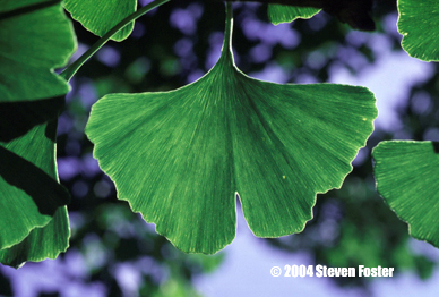Ginkgo
What is ginkgo? 
Ginkgo is an herbal remedy made from the leaf of the ginkgo tree, Ginkgo biloba, which is one of the oldest species of tree in the world. The ginkgo nut is used in Traditional Chinese Medicine in the treatment of respiratory disorders. The ginkgo leaf is used in Western herbal medicine, primarily to stimulate blood flow, both peripheral (to the extremities) and cerebral (to the brain).
Most research on ginkgo has been done using an extract standardized to deliver 24% ginkgo flavonol glycosides and 6% terpene lactones.
Why recommend administration of ginkgo to my pet?
In people ginkgo is recommended for treatment of dementia, memory deficits, headache, tinnitus (ringing or buzzing in the ear), and intermittent spasm arising from decreased blood flow to muscle.
"Ginkgo is one of the few herbs where placebo controlled clinical trials have been conducted in humans."
Ginkgo is one of the few herbs where placebo controlled clinical trials have been conducted in humans. Improvements in Alzheimer and dementia patients following the use of standardized ginkgo extract are considered clinically significant.
In dogs, ginkgo is most commonly recommended for the treatment of cognitive disorder (a degenerative disorder of the brain causing a form of senility), with anecdotal reports of success. No clinical trials have been conducted, however.
Given its ability to stimulate peripheral and cerebral blood flow, ginkgo may be underutilized in veterinary medicine. Studies in cats demonstrate that ginkgo speeds recovery from central nervous system (brain and spinal cord) injury, hastening normalization of vestibular function (the ability to maintain posture, muscle tone, and equilibrium). Ginkgo should probably be investigated for use in all cerebral disorders involving hypoxia (low oxygen levels) and an interruption of blood flow in small animals, including trauma.
Another use of ginkgo in humans that may be explored in small animals is the herb's ability to improve blood flow to the retina (the nerve rich area lining the back of the eye). A study in cats suffering damage to the retina following an increase in pressure in the eye (intraocular pressure) demonstrated a more rapid recovery of vision in animals receiving ginkgo. Lastly, ginkgo's ability to increase dilation of blood vessels (peripheral vasodilation) suggests it should be considered as a component of treatment protocols for congestive heart failure.
How safe is ginkgo?
Ginkgo appears to be safe for use in people and animals. Extremely high doses have been given in animals for long periods of time without serious consequences.
"Ginkgo should be avoided in patients with impaired blood clotting ability..."
Ginkgo should be avoided in patients with impaired blood clotting ability (whether due to disease or blood-thinning drugs), since ginkgo also inhibits blood clotting by inhibiting platelet aggregation. There have been two case reports in highly regarded journals of subdural hematoma (bleeding in the skull) and hyphema (spontaneous bleeding into the anterior chamber of the eye) in association with ginkgo use in people. Ginkgo should also be avoided in patients known to be allergic to the plant, and safety has not yet been established for use in pregnancy and lactation.
"As a precaution, do not use in pets with bleeding disorders, within one week of surgery, or when blood-thinning agents are being used."
As a precaution, do not use in pets with bleeding disorders, within one week of surgery, or when blood-thinning agents are being used. Ginkgo should not be combined with high doses of fatty acids due to the potential for serious bleeding disorders.
Where do I obtain ginkgo and do I need a prescription?
Pet owners are cautioned against buying supplements without knowledge of the manufacturer, as supplements are not highly regulated and some supplements may not contain the labelled amount of ginkgo. As mentioned, all research benefits of ginkgo were seen with the use of standardized extracts. The benefits of crude whole leaf extracts are not known, although clinical outcomes appear favorable. A prescription is not necessary for ginkgo. Your veterinarian may have preferred brands of supplements that he or she may recommend.






